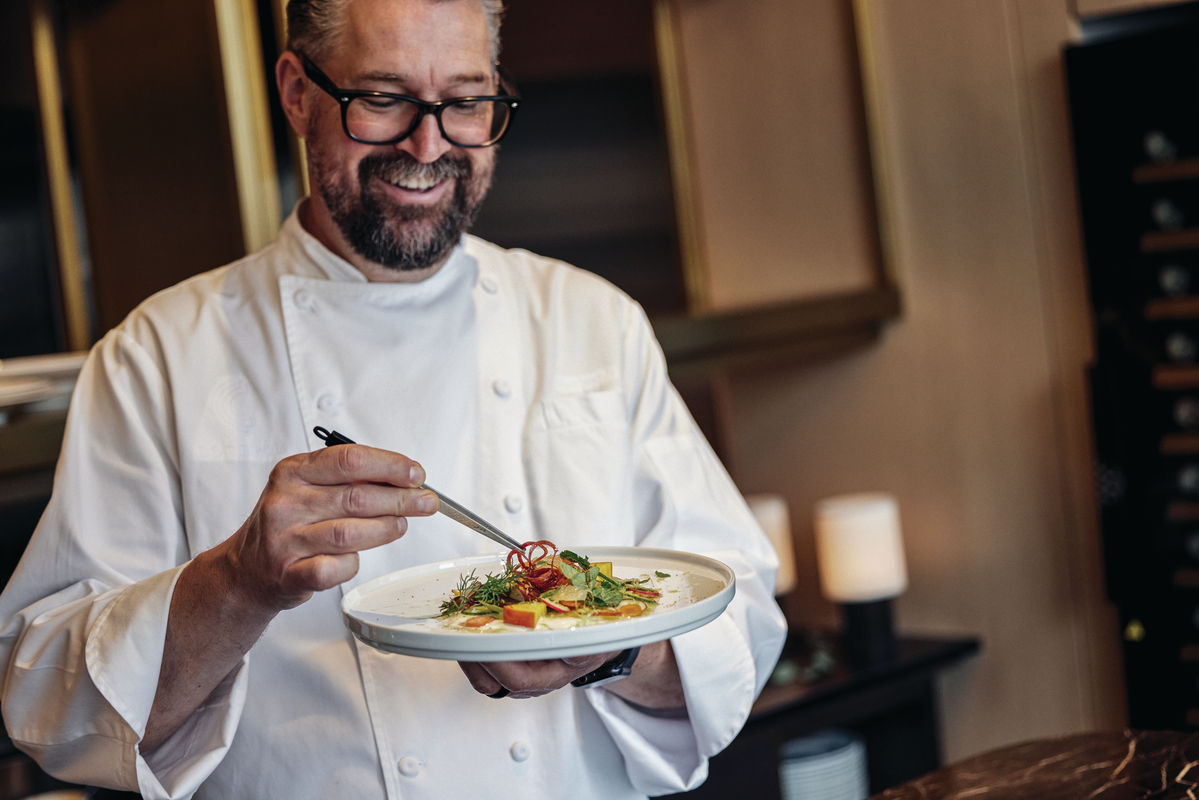November 1, 2022
3 min read
The Reimagined Dining of Coterie Memory Care
Nutritious dishes and thoughtful collaborations are always on the menu.

The aroma of garlic sautéing on the stove is instantly recognizable. For many, it carries strong reminiscences, perhaps all the way back to childhood, of time spent in their own kitchens, and meals shared with family and friends.
Fragrancing the air at each mealtime is just one example of a culinary program uniquely tailored to its memory care residents. “Our memory care dining is a totally bespoke experience,” said Chad Welch, Coterie Executive Chef. “Residents in our memory care neighborhood enjoy the same menus offered in our independent and assisted living restaurants, but with additions personalized to them.”
“The unique thing about our memory care is we have a full kitchen on these floors,” Welch said. “It gives us the advantage of being able to customize and cook for the individual. If one of our residents wants tortellini on Tuesday, we’re going to make tortellini on Tuesday.”
Coterie chefs collaborate with Mayo Clinic specialists to create dishes optimized for cognitive nutrition. “Not only do we have access to the full library of Mayo Clinic recipes, but as I’m creating a menu, I send ideas to Mayo’s Wellness Chef, Jen Welper,” Welch said. “She’ll have suggestions, like using a different cooking oil or adding walnuts, which are high in antioxidants, to a salad. Working in conjunction results in menus that are fresh and highly nutritious.”
Avocados. Leafy greens. Dark-fleshed fruits and fresh berries. Coterie chefs are very familiar with the types of foods that carry the extra antioxidants and omega-3 fatty acids that nourish the brain and can slow cognitive decline. To help residents reap the benefits of this specialized nutrition, Coterie partners with leaders in the field of Alzheimer’s disease and dementia research, including CaringKind, a nonprofit based in New York City.
Through this collaboration, Coterie and CaringKind work together to provide ongoing training to caregivers on evidence-backed approaches for symptoms management. A common behavior in memory care dining, for instance, is fixating on one particular food.
“Through our work with CaringKind, we’ve devised a ‘modeling’ method that assists residents who are reluctant to add variety to their diet,” Welch said. “One of our caregivers will sit with them and eat the exact same meal. Having someone sit next to them and see them enjoy the meal and model the experience is an effective way for them to adopt a better diet.”
CaringKind’s guidance on empathetic communication also adds to a quality dining experience. Trained caregivers know how to present information in the clearest manner for those with these conditions. “Are you ready to eat?”, for instance, is a difficult question for someone with dementia. “Would you prefer the pasta or the chicken?” is better framing to reduce anxiety and assist with a selection.
Coterie uses many tools to provide calm and consistent dining for memory care. Our circadian lighting system mimics the daylight spectrum of the sun to help residents better recognize the time of day and when mealtime is approaching. Escorts guide residents to and from meals for further safety and comfort.
Each memory care resident carries a lifetime of connections to food and drink. With tasteful menus tailored to the individual, ongoing collaboration with leaders in the field, and settings thoughtfully designed to meet the needs of our residents, dining at Coterie is an opportunity to savor, nourish, and further these fond connections.
Coterie operates a portfolio of luxury senior living communities spanning the East and West Coasts. Please note that the services, partnerships, and amenities mentioned in this article may vary by location.
You might also like
Want to learn more about life at Coterie?